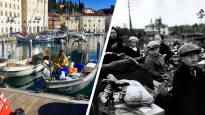The enlargement of the EU in the Balkans has pushed for controversy over stagnation. The letter will then be on summer break.
It is still a light year before the EU flag flies in the countries of the Western Balkans alongside its own flag.
No other conclusion can be drawn from the slow pace of the EU’s rise in the south-east of Europe.
Northern Macedonia became a candidate in 2005, Serbia in 2009, Montenegro in 2010 and Albania in 2014. It takes a total of 50 years, or half a century, to apply, and no country is close to membership yet.
Only Serbia and Montenegro have reached the actual negotiations at all. Both have been negotiating for a decade, with Montenegro completing three chapters and Serbia two. There are dozens left.
ISSUED that the starting point in the Balkans is ulcerative.
Underlying this is a long and brutal blend of Yugoslavia into the wars of disintegration in the 1990s. Those traumas don’t go away with just a sip of plum liquor or a dose Goran Bregovic creepy music.
On the other hand, the countries are no longer in a state of open war and are not completely confused. They have had time to shine, at least from the surface, into democracies, and in all of them, EU membership has the strong support of the people.
It is a matter of honor.
GREECE FIRST for years delayed the start of accession negotiations with northern Macedonia because it did not want the country to call itself Macedonia. It was a matter of honor for Greece that the name Macedonia was reserved for its own historic province.
The controversy did not start until 2018, when Macedonia flexed its name as Northern Macedonia. After that, Bulgaria became active as a new brake.
It considers the language spoken in Macedonia to be a Bulgarian dialect and wants Northern Macedonia to enshrine the constitutional rights of the Bulgarian minority in the country.
Until a week ago, it seemed that the pro-Western government in Bulgaria would get over it and come to an agreement, but this week the government collapsed. If the nationalists get more power, the fear is a return to the starting box.
Serbia, on the other hand, is experiencing a sacred connection with Russia through Slavicism and Orthodoxy. It opposes the independence of Kosovo and the status of an EU candidate country in spirit and blood, as in 1389 the Serbs lost the battle against the Ottomans in the Kosovo Police.
The place is in what is now Kosovo, and that is why Serbia historically considers Kosovo to be part of itself.
And so on. This was just the beginning of the number of issues of honor in the Balkans during the iso-iso-iso-iso-iso-iso-iso-guarantees.
IF ANYTHING Bulgaria would be Finland, in the event of enlargement it would raise the threshold of issues such as the status of the Finnish-speaking residents of extradited Karelia and the minority treatment of Finns in Sweden.
We would hear solemn stories of how Petsamo was an ancient residence of the Sámi before it was looted by the Soviet Union.
At the same time, we would smoothly forget that the Finns themselves considered the Sámi to be a lower race in the spirit of the early 20th century. It is a matter of national honor to keep quiet about the other side of the issue. They mess up the glorious story.
Finland has learned to move forward, perhaps for its smallness, perhaps for historical reasons. The ceded Karelia lost its time but is part of Russia for present generations, no longer the sacred Finnish romantic singing countries.
THIS IS NOT a little different than in the twists and turns of the Balkans.
It is only a short distance from sacred national issues of honor to Putinism, that what happened a century ago can justify anything today.
Next, I compiled a lot of EU news this week.
Coming soon: The letter will be on summer vacation – but there is a busy news summer ahead
NATO summit will be held next week from Wednesday to Thursday in Madrid. Behind the scenes, Turkey has been scared to open a deadlock that prevents Finland and Sweden from joining – is reporting on the spot.
Russian an attack on Ukraine will keep the EU on its toes across July. The EU will not retire until August. It is still important to create actions that seem incomprehensible to Russia, and this is what the Emeritus Professor, among others, is doing. Timo Vihavainen In the recent episode of the Brussels plane.
In July the fight against economic collapse and inflation, preparations for the autumn climate talks and the filling of gas reserves for the winter are also continuing.
Still an answer last week’s visa: Europe’s oldest airport is Hamburg Airport, which opened in 1911. It was first used primarily by airships. The field has been slightly smaller than Helsinki-Vantaa in terms of passenger numbers.
From us Authors of the letter of Europe to you readers good summer!
You can discuss the topics of the letter. The debate is open until 11 p.m. Saturday night.
